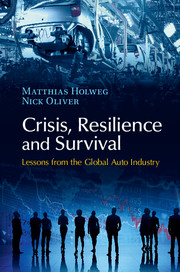Book contents
- Frontmatter
- Dedication
- Contents
- List of figures
- List of tables
- Acknowledgements
- 1 Why a book on corporate resilience?
- 2 The evolution of a global industry
- 3 Competing in a global industry
- 4 Concepts: Stakeholders, operations and context
- 5 Rover: Inside a failing car company
- 6 The failure of Saab Automobile
- 7 Near misses: Chrysler and Nissan
- 8 The future shape of the industry
- Appendix
- Notes
- Bibliography
- Secondary data sources
- Index
1 - Why a book on corporate resilience?
Published online by Cambridge University Press: 05 December 2015
- Frontmatter
- Dedication
- Contents
- List of figures
- List of tables
- Acknowledgements
- 1 Why a book on corporate resilience?
- 2 The evolution of a global industry
- 3 Competing in a global industry
- 4 Concepts: Stakeholders, operations and context
- 5 Rover: Inside a failing car company
- 6 The failure of Saab Automobile
- 7 Near misses: Chrysler and Nissan
- 8 The future shape of the industry
- Appendix
- Notes
- Bibliography
- Secondary data sources
- Index
Summary
Corporate failure is an increasingly prevalent occurrence. Interest in resilience – the avoidance of failure and the recovery from it – is therefore unsurprisingly on the rise: The average lifespan of a company listed in the S&P 500 index has decreased by more than 50 years in the last century, to a mere 15 years by 2010. Company life expectancies are reducing, and so are CEO tenures. Many reasons for this trend have been put forward: technological innovation, low-cost competition, overcapacity, and an increasing focus on short-term financial returns in many business environments. From a free market perspective, occasional failure is not a bad thing, a sign of creative destruction. Firms that are unable to generate sufficient returns should go out of business, or be taken over by stronger, more efficient firms. Yet in cyclical, mature industries this short-termism may deprive companies of the opportunity to develop long-lasting capabilities that generate wealth in the long term.
The ‘industry of industries’, as Peter Drucker once called the automotive industry, is a perfect setting to explore these challenges. Yet many other sectors, such as aerospace, electronics and industrial equipment, face the same problem: firms are battered by cyclical markets that see demand drop drastically in a downturn, while they struggle to reduce the large structural cost embedded in their business. Recurring crises become the norm. Emerging markets have been both a bane and a boon in this respect – often providing the greatest opportunity for growth and a major threat due to new entrants at the same time. How can firms develop resilience to perennial problems such as global overcapacity and low-cost competition, to withstand the pressures that they face during a downswing in the business cycle? In short, what does it take to survive in a mature global industry? This is the question we seek to answer in this book.
MANAGEMENT OR CONTEXT?
Our analysis combines the perspectives of two, usually opposing, schools of thought on corporate success and failure. Within writings on general management (by which we broadly mean strategy, organizational behaviour and operations management) there are ample examples of ‘best-practice’ literature. This literature typically identifies the practices found in relatively successful companies and describes these, often in a highly stylized form, in a manner suitable for consumption and transfer to other environments.
- Type
- Chapter
- Information
- Crisis, Resilience and SurvivalLessons from the Global Auto Industry, pp. 1 - 7Publisher: Cambridge University PressPrint publication year: 2015



